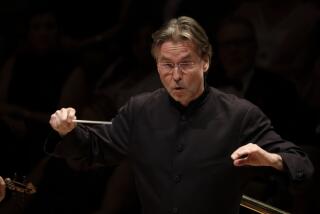Beauty, pleasure abound in a Baroque allegory
- Share via
Conductor Martin Haselbock returned to the helm of the Musica Angelica Baroque Orchestra in Zipper Concert Hall on Saturday night, presiding over a rarely performed Handel oratorio -- the composer’s first.
“Il Trionfo del Tempo e del Disinganno” will come as a bit of a surprise if your experience with the genre is limited to choral settings of religious stories and texts.
The subject matter is as secular as it is allegorical: the forces of Time and Disillusion gradually taking their toll on Beauty, separating it from Pleasure, turning toward God in the end. There is no chorus, and Time, Disillusion, Beauty and Pleasure are each represented by a single, solo voice.
In other words, this amounts to a Baroque conversation piece -- in some ways, a distant ancestor of Richard Strauss’ “Capriccio” -- and at first it dances and dazzles in the 22-year-old Handel’s best Italian style. Further into the piece, as Time and Disillusion work their wills, the zest is gradually overcome by an austerity of texture and means, ending not in blazing affirmation but an almost resigned serenity.
Haselbock caught it all with a graceful, rhythmic lilt and considerable verve, drawing mostly unified, enthusiastic playing from the orchestra. He also contributed the Baroque organ parts, shining in the solo passages of the miniature organ concerto in the center of Part 1.
Katerina Beranova (Beauty) displayed a rich, creamy soprano, more than equal to every florid Handel challenge, and Catherine Webster’s (Pleasure) lighter, soaring lyric soprano and flashes of temperament in Part 2 made a fine contrasting match. Countertenor Jason Snyder (Disillusion) and tenor Gerald Gray (Time) rounded out the well-balanced vocal quartet.
Handel apparently couldn’t let go of this early composition -- he revised it twice, the second time in English (“The Triumph of Time and Truth”) with choral parts at the end of his life -- but we heard the original version in Italian.
For a touch of theatricality, the singers were clad in costumes imported from the 2004 Salzburg Festival production; from a close-up perspective, they looked like glorified plastic tarps.
More to Read
The biggest entertainment stories
Get our big stories about Hollywood, film, television, music, arts, culture and more right in your inbox as soon as they publish.
You may occasionally receive promotional content from the Los Angeles Times.










